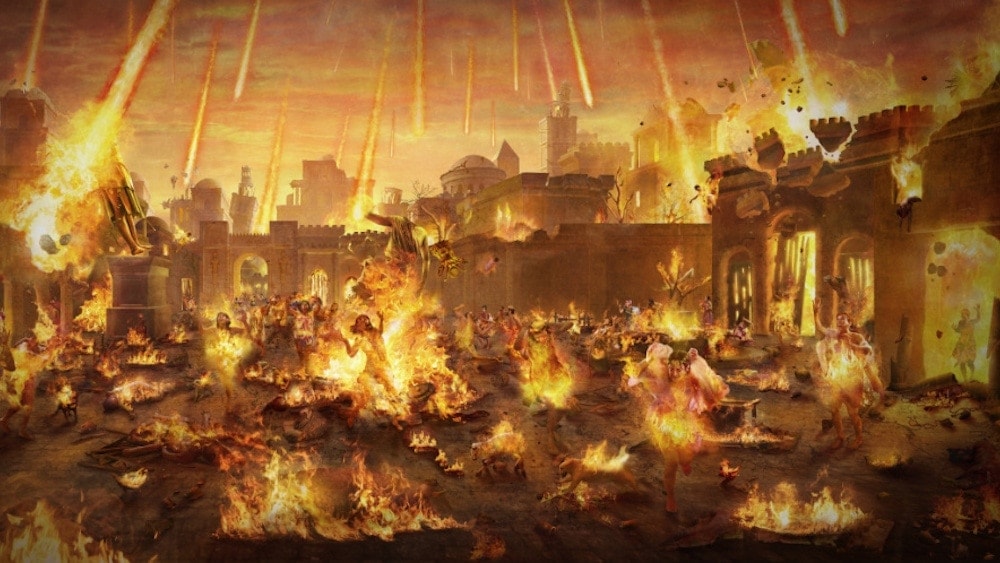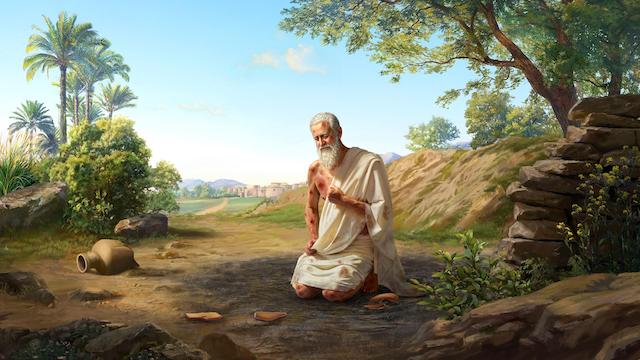God Must Destroy Sodom
Gen 18:26 And Jehovah said, If I find in Sodom fifty righteous within the city, then I will spare all the place for their sakes.
Gen 18:29 And he spoke to Him yet again, and said, Peradventure there shall be forty found there. And He said, I will not do it.
Gen 18:30 And he said to Him, Peradventure there shall thirty be found there. And He said, I will not do it.
Gen 18:31 And he said, Peradventure there shall be twenty found there. And He said, I will not destroy it.
Gen 18:32 And he said, Peradventure ten shall be found there. And He said, I will not destroy it.
These are a few excerpts I have chosen from the Bible. They are not the complete, original versions. If you wish to see those, you can look them up in the Bible yourselves; to save time, I have omitted part of the original content. Here I have only selected several key passages and sentences, leaving out several sentences that have no bearing on our fellowship today. In all the passages and content we fellowship about, our focus skips over the details of the stories and man’s conduct in the stories; instead, we only speak of what God’s thoughts and ideas were at the time. In God’s thoughts and ideas, we will see the disposition of God, and from everything God did, we will see the true God Himself—in this, we will achieve our objective.
God Only Cares About Those Who Are Able to Obey His Words and Follow His Commands

The passages above contain several key words: the numbers. First, Jehovah said that if He found fifty righteous within the city, then He would spare all the place, which is to say, He would not destroy the city. So were there, in fact, fifty righteous within Sodom? There were not. Soon after, what did Abraham say to God? He said, Peradventure there shall be forty found there? And God said, I will not do it. Next, Abraham said, Peradventure there shall thirty be found there? And God said, I will not do it. And peradventure twenty? I will not do it. Ten? I will not do it. Were there, in fact, ten righteous within the city? There were not ten—but there was one. And who was this one? It was Lot. At the time, there was but one righteous person in Sodom, but was God very stringent or exacting when it came to this number? No, He was not! And so when man kept asking, “What about forty?” “What about thirty?” until he got to “What about ten?” God said, “Even if there were only ten, I would not destroy the city; I would spare it, and forgive the other people besides these ten.” If there were only ten, that would have been pitiful enough, but it turned out that, in fact, there was not even that number of righteous people in Sodom. You see, then, that in the eyes of God, the sin and evil of the city’s people were such that God had no choice but to destroy them. What did God mean when He said that He would not destroy the city if there were fifty righteous? These numbers were not important to God. What was important was whether or not the city contained the righteous that He wanted. If the city had but one righteous person, God would not allow them to come to harm due to His destruction of the city. What this means is that, regardless of whether or not God was going to destroy the city, and regardless of how many righteous were within it, to God this sinful city was cursed and execrable, and should be destroyed, should vanish from the eyes of God, while the righteous should remain. Regardless of the era, regardless of the stage of mankind’s development, the attitude of God does not change: He hates evil, and cares about those who are righteous in His eyes. This clear attitude of God is also the true revelation of the essence of God. Because there was but one righteous person within the city, God hesitated no longer. The end result was that Sodom would inevitably be destroyed. What do you see in this? In that age, God would not destroy a city if there were fifty righteous within it, nor if there were ten, which means that God would decide to forgive and be tolerant toward mankind, or would do the work of guidance, because of a few people who were able to fear and worship Him. God places great stock in man’s righteous deeds, He places great stock in those who are able to worship Him, and He places great stock in those who are able to do good deeds before Him.
From the earliest times until today, have you ever read in the Bible of God communicating the truth, or speaking about the way of God, to any person? No, never. The words of God to man that we read of only told people what to do. Some went and did it, some did not; some believed, and some did not. That’s all there was. Thus, the righteous of that age—those who were righteous in the eyes of God—were merely those who could hear God’s words and follow God’s commands. They were servants who carried out God’s words among man. Could such people be called those who know God? Could they be called people who were made perfect by God? No, they could not. So, regardless of their number, in the eyes of God were these righteous people worthy of being called the confidants of God? Could they be called God’s witnesses? Certainly not! They were certainly not worthy of being called God’s confidants and witnesses. So, what did God call such people? In the Old Testament of the Bible, there are many instances of God calling them “My servant.” That is to say, at that time, in the eyes of God these righteous people were the servants of God, they were the people who served Him on earth. And how did God think of this appellation? Why did He call them so? Does God have standards in His heart for the appellations by which He calls people? He certainly does. God has standards, regardless of whether He calls people righteous, perfect, upright, or servants. When He calls someone His servant, He is of the firm belief that this person is able to receive His messengers, able to follow His commands, and able to carry out that which is commanded by the messengers. What does this person carry out? They carry out that which God commands man to do and carry out on earth. At that time, could that which God asked man to do and carry out on earth be called the way of God? No, it could not. For at that time, God asked only that man do a few simple things; He uttered a few simple commands, telling man to only do this or that, and nothing more. God was working according to His plan. Because, at that time, many conditions were not yet present, the time was not yet ripe, and it was difficult for mankind to bear the way of God, thus the way of God had yet to begin to be issued forth from God’s heart. God saw the righteous people He spoke of, whom we see here—whether thirty or twenty—as His servants. When the messengers of God came upon these servants, they would be able to receive them, and follow their commands, and act according to their words. This was precisely what should be done, and attained, by those who were servants in God’s eyes. God is judicious in His appellations for people. He did not call them His servants because they were as you are now—because they had heard much preaching, knew what God was to do, understood much of God’s will, and comprehended His management plan—but because they were honest in their humanity and they were able to comply with God’s words; when God commanded them, they were able to put aside what they were doing and carry out that which God had commanded. So for God, the other layer of meaning in the title of servant is that they cooperated with His work on earth, and although they were not the messengers of God, they were the executors and implementers of God’s words on earth. You see, then, that these servants or righteous people carried great weight in the heart of God. The work that God was to embark upon on earth could not be without people to cooperate with Him, and the role undertaken by the servants of God was irreplaceable by the messengers of God. Each task that God commanded unto these servants was of great importance to Him, and so He could not lose them. Without these servants’ cooperation with God, His work among mankind would have come to a standstill, as a result of which God’s management plan and God’s hopes would have come to naught.
God Is Abundantly Merciful Toward Those Whom He Cares About, and Profoundly Wrathful Toward Those Whom He Detests and Rejects
In the accounts of the Bible, were there ten servants of God in Sodom? No, there were not! Was the city worthy of being spared by God? Only one person in the city—Lot—received God’s messengers. The implication of this is that there was only one servant of God in the city, and thus God had no choice but to save Lot and destroy the city of Sodom. The exchanges between Abraham and God quoted above may seem simple, but they illustrate something very profound: There are principles to God’s actions, and prior to making a decision He will spend a long time observing and deliberating; He will definitely not make any decisions or jump to any conclusions before the time is right. The exchanges between Abraham and God show us that God’s decision to destroy Sodom was not in the slightest bit wrong, for God already knew that in the city there were not forty righteous, nor thirty righteous, nor twenty. There were not even ten. The only righteous person in the city was Lot. All that happened in Sodom and its circumstances were observed by God, and were as familiar to God as the back of His own hand. Thus, His decision could not be wrong. In contrast, compared to the almightiness of God, man is so numb, so foolish and ignorant, so short-sighted. This is what we see in the exchanges between Abraham and God. God has been issuing forth His disposition from the beginning until today. Here, likewise, there is also the disposition of God that we should see. Numbers are simple—they do not demonstrate anything—but here there is a very important expression of God’s disposition. God would not destroy the city because of fifty righteous. Is this due to the mercy of God? Is it because of His love and tolerance? Have you seen this side of God’s disposition? Even if there were only ten righteous, God would not have destroyed the city, because of these ten righteous people. Is this or is this not the tolerance and love of God? Because of God’s mercy, tolerance, and concern toward those righteous people, He would not have destroyed the city. This is the tolerance of God. And in the end, what outcome do we see? When Abraham said, “Peradventure ten shall be found there,” God said, “I will not destroy it.” After that, Abraham said no more—for within Sodom there were not the ten righteous he referred to, and he had no more to say, and at that time he understood why God had resolved to destroy Sodom. In this, what disposition of God do you see? What kind of resolution did God make? God resolved that, if this city had not ten righteous, He would not permit its existence, and would inevitably destroy it. Is this not the wrath of God? Does this wrath represent God’s disposition? Is this disposition the revelation of God’s holy essence? Is it the revelation of God’s righteous essence, which man must not offend? Having confirmed that there were not ten righteous in Sodom, God was certain to destroy the city, and would severely punish the people within that city, for they opposed God, and because they were so filthy and corrupt.
Why have we analyzed these passages in this way? It is because these few simple sentences give full expression to God’s disposition of abundant mercy and profound wrath. At the same time as treasuring the righteous, and having mercy upon, tolerating, and caring about them, in God’s heart there was a deep loathing for all those in Sodom who had been corrupted. Was this, or was it not, abundant mercy and profound wrath? By what means did God destroy the city? By fire. And why did He destroy it using fire? When you see something being burned by fire, or when you are about to burn something, what are your feelings toward it? Why do you want to burn it? Do you feel that you no longer need it, that you no longer wish to look at it? Do you want to abandon it? God’s use of fire means abandonment, and hate, and that He no longer wished to see Sodom. This was the emotion that made God raze Sodom with fire. The use of fire represents just how angry God was. The mercy and tolerance of God do indeed exist, but God’s holiness and righteousness when He unleashes His wrath also show man the side of God that brooks no offense. When man is fully capable of obeying the commands of God and acts in accordance with God’s requirements, God is abundant in His mercy toward man; when man has been filled with corruption, hatred and enmity for Him, God is profoundly angry. To what extent is He profoundly angry? His wrath will last until God no longer sees man’s resistance and evil deeds, until they are no longer before His eyes. Only then will God’s anger disappear. In other words, no matter who the person is, if their heart has become distant from God and turned away from God, never to return, then regardless of how, to all appearances or in terms of their subjective desires, they wish to worship and follow and obey God in their body or in their thinking, God’s wrath will be unleashed without cease. It will be such that when God deeply unleashes His anger, having given man ample opportunities, once it is unleashed there will be no way of taking it back, and He will never again be merciful and tolerant of such a mankind. This is one side of God’s disposition that tolerates no offense. Here, it seems normal to people that God would destroy a city, for, in God’s eyes, a city full of sin could not exist and continue to remain, and it was rational that it should be destroyed by God. Yet in that which happened prior to and following His destruction of Sodom, we see the entirety of God’s disposition. He is tolerant and merciful toward things that are kind and beautiful and good; toward things that are evil, sinful, and wicked, He is profoundly wrathful, such that He is unceasing in His wrath. These are the two principal and most prominent aspects of God’s disposition, and, moreover, they have been revealed by God from beginning to end: abundant mercy and profound wrath. Most of you have experienced something of God’s mercy, but very few of you have appreciated God’s wrath. God’s mercy and lovingkindness can be seen in every person; that is, God has been abundantly merciful toward every person. Yet very rarely—or, it can be said, never—has God been profoundly angry toward any individuals or any section of the people among you. Relax! Sooner or later, God’s wrath will be seen and experienced by every person, but now is not yet the time. Why is this? It is because when God is constantly angry toward someone, that is, when He unleashes His profound wrath upon them, this means that He has long since detested and rejected this person, that He despises their existence, and that He cannot endure their existence; as soon as His anger comes upon them, they will disappear. Today, God’s work has yet to reach that point. None of you will be able to bear it once God becomes profoundly angry. You see, then, that at this time God is only abundantly merciful toward you all, and you have yet to see His profound anger. If there are people who remain unconvinced, you can ask that God’s wrath come upon you, so that you may experience whether or not God’s anger and His disposition which brooks no offense by man really exist. Do you dare?
The People of the Last Days Only See God’s Wrath in His Words, and Do Not Truly Experience the Wrath of God
Are the two sides of God’s disposition that are seen in these passages of scripture worthy of fellowship? Having heard this story, do you have a renewed understanding of God? What kind of understanding do you have? It can be said that from the time of creation until today, no group has enjoyed as much of God’s grace or mercy and lovingkindness as this final group. Although, in the final stage, God has done the work of judgment and chastisement, and has done His work with majesty and wrath, most of the time God only uses words to accomplish His work; He uses words to teach and water, to provide and feed. God’s wrath, meanwhile, has always been kept hidden, and apart from experiencing God’s wrathful disposition in His words, very few people have experienced His anger in person. This is to say, during God’s work of judgment and chastisement, although the wrath revealed in God’s words allows people to experience God’s majesty and His intolerance of offense, this wrath does not go beyond His words. In other words, God uses words to rebuke man, expose man, judge man, chastise man, and even condemn man—but God has yet to be profoundly angry toward man, and has barely even unleashed His wrath upon man except with His words. Thus, the mercy and lovingkindness of God experienced by man in this age are the revelation of God’s true disposition, while the wrath of God experienced by man is merely the effect of the tone and feel of His utterances. Many people wrongly take this effect to be the true experiencing and the true knowledge of God’s wrath. Consequently, most people believe that they have seen God’s mercy and lovingkindness in His words, that they have also beheld God’s intolerance of man’s offense, and most of them have even come to appreciate God’s mercy and tolerance toward man. But no matter how bad man’s behavior, or how corrupt his disposition, God has always endured. In enduring, His aim is to wait for the words He has spoken, the efforts He has made and the price He has paid to achieve an effect in those whom He wishes to gain. Waiting for an outcome such as this takes time, and requires the creation of different environments for man, in the same way that people do not become adults as soon as they are born; it takes eighteen or nineteen years, and some people even need twenty or thirty years before they mature into a real adult. God awaits the completion of this process, He awaits the coming of such a time, and He awaits the arrival of this outcome. Throughout the time that He waits, God is abundantly merciful. During the period of God’s work, however, an extremely small number of people are struck down, and some are punished because of their grave opposition to God. Such examples are even greater proof of the disposition of God that does not brook the offense of man, and fully confirm the real existence of God’s tolerance and endurance toward the chosen ones. Of course, in these typical examples, the revelation of part of the disposition of God in these people does not affect God’s overall management plan. In fact, in this final stage of God’s work, God has endured throughout the period He has been waiting, and He has exchanged His endurance and His life for the salvation of those who follow Him. Do you see this? God does not upset His plan without reason. He can unleash His wrath, and He can also be merciful; this is the revelation of the two main parts of God’s disposition. Is this, or is it not, very clear? In other words, when it comes to God, right and wrong, just and unjust, the positive and the negative—all this is clearly shown to man. What He will do, what He likes, what He hates—all this can be directly reflected in His disposition. Such things can also be very obviously and clearly seen in God’s work, and they are not vague or general; instead, they allow all people to behold the disposition of God and what He has and is in an especially concrete, true and practical manner. This is the true God Himself.
God’s Disposition Has Never Been Hidden From Man—Man’s Heart Has Strayed From God
If I did not fellowship about these things, none of you would be able to behold the true disposition of God in the stories of the Bible. This is fact. That is because, though these biblical stories recorded some of the things that God did, God spoke but a few words, and did not directly introduce His disposition or openly issue forth His will to man. Later generations have regarded these records as nothing more than stories, and so it appears to people that God hides Himself from man, that it is not God’s person that is hidden from man, but His disposition and will. After My fellowship today, do you still feel that God is fully hidden from man? Do you still believe that God’s disposition is hidden from man?
Since the time of creation, God’s disposition has been in step with His work. It has never been hidden from man, but fully publicized and made plain to man. Yet, with the passing of time, man’s heart has grown ever more distant from God, and as man’s corruption has become deeper, man and God have become further and further apart. Slowly but surely, man has disappeared from the eyes of God. Man has become unable to “see” God, which has left him without any “news” of God; thus, he does not know whether God exists, and even goes so far as to completely deny the existence of God. Consequently, man’s incomprehension of God’s disposition, and what He has and is, is not because God is hidden from man, but because his heart has turned away from God. Though man believes in God, man’s heart is without God, and he is ignorant of how to love God, nor does he want to love God, for his heart never draws close to God and he always avoids God. As a result, man’s heart is distant from God. So, where is his heart? In fact, man’s heart has not gone anywhere: Instead of giving it to God or revealing it to God to see, he has kept it for himself. This is despite the fact that some people often pray to God and say, “O God, look upon my heart—You know all that I think,” and some even swear to let God look upon them, that they may be punished if they break their oath. Though man allows God to look within his heart, this does not mean that man is capable of obeying the orchestrations and arrangements of God, nor that he has left his fate and prospects and his all under the control of God. Thus, regardless of the oaths you make to God or what you declare to Him, in God’s eyes your heart is still closed to Him, for you only allow God to look upon your heart but do not permit Him to control it. In other words, you have not given your heart to God at all, and only speak nice-sounding words for God to hear; meanwhile, you hide your various deceitful intentions from God, together with your intrigues, scheming, and plans, and you clutch your prospects and fate in your hands, deeply afraid that they will be taken away by God. Thus, God never beholds man’s sincerity toward Him. Though God does observe the depths of man’s heart, and can see what man is thinking and wishes to do in his heart, and can see what things are kept within his heart, man’s heart does not belong to God, and he has not given it over to God’s control. This is to say, God has the right to observe, but He does not have the right to control. In the subjective consciousness of man, man does not want or intend to give himself over to God’s arrangements. Not only has man closed himself off to God, but there are even people who think of ways to wrap up their hearts, using smooth talk and flattery to create a false impression and gain the trust of God, and concealing their true face out of sight from God. Their aim in not allowing God to see is to not allow God to perceive what they really are like. They do not want to give their hearts to God, but to keep them for themselves. The subtext of this is that what man does and what he wants is all planned, calculated, and decided by man himself; he does not require the participation or intervention of God, much less does he need the orchestrations and arrangements of God. Thus, whether in regard to the commands of God, His commission, or the requirements that God makes of man, man’s decisions are based on his own intentions and interests, on his own state and circumstances at the time. Man always uses the knowledge and insights that he is familiar with, and his own intellect, to judge and select the path he should take, and does not allow the interference or control of God. This is the heart of man that God sees.
From the beginning until today, only man has been capable of conversing with God. That is, among all living things and creatures of God, none but man has been able to converse with God. Man has ears that enable him to hear, and eyes that let him see; he has language, and his own ideas, and free will. He is possessed of all that is required to hear God speak, and understand God’s will, and accept God’s commission, and so God confers all His wishes upon man, wanting to make man a companion who is of the same mind with Him and who can walk with Him. Since He began to manage, God has been waiting for man to give his heart to Him, to let God purify and equip it, to make him satisfactory to God and loved by God, to make him fear God and shun evil. God has ever looked forward to and awaited this outcome.
—The Word, Vol. 2. On Knowing God. God’s Work, God’s Disposition, and God Himself II








